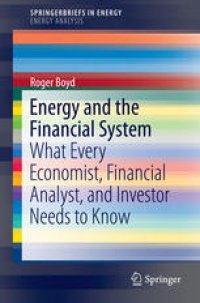
Ebook: Energy and the Financial System: What Every Economist, Financial Analyst, and Investor Needs to Know
Author: Roger Boyd (auth.)
- Tags: Finance/Investment/Banking, Energy Policy Economics and Management, Energy Economics, Economic Growth, Fossil Fuels (incl. Carbon Capture), Environmental Economics
- Series: SpringerBriefs in Energy : Energy Analysis
- Year: 2013
- Publisher: Springer International Publishing
- Edition: 1
- Language: English
- pdf
The modern financial system was developed to support the rapid economic growth that took off about 200 years ago with the phenomenal amounts of cheap energy made available through the exploitation of fossil fuels. As a result, its viability is completely dependent upon the continuation of that growth. Unfortunately, the more recent fossil fuel discoveries, especially for oil, have tended to have lower production levels than earlier ones. In addition, greater amounts of energy are required to extract the fossil fuels leading to less net energy available for society. The Energy Return On Investment (EROI) for oil has fallen from 30:1 in the 1970's to 10:1 today. Thus, newer energy finds produce lower extraction rates and more of the energy provided is offset by the energy used in the extraction processes. The result has been economic stagnation or even contraction, with growth in China and India etc. only possible due to the extensive use of local coal reserves, and recession-induced drops in OECD country energy use. Renewable sources of energy will not be able to expand fast enough to replace the 87% of energy supplies provided by fossil fuels, and apart from hydro and wind, tend to have very low EROI rates. They are also critically dependent upon the cheap energy infrastructure provided by fossil fuels. The phenomenal amounts of path-dependent energy infrastructure will also greatly inhibit any move away from fossil fuels.
Without continued economic growth there will not be the extra output to fund loan interest payments, nor the revenue and profit growth to support share price/earnings multiples. The financial system acts as a time machine, creating asset prices based upon perceptions of the future. As an increasing percentage of investors come to accept the future reality of at best, financial asset prices will fall to reflect a realistic future. The resulting crash will remove the underpinnings of the banking, brokerage, mutual fund, pension fund, and insurance industries. The comfortable futures of many will be shown to have been based upon a mirage of future growth that will not take place. With the financial system acting as the critical coordination system of the global economy, its crash will also intensify economic problems. Written by a retired financial industry executive with over 25 years of experience, this book describes how the crisis will affect different regions and industries to help identify the career and investment choices which may provide a relative safe harbour.
The financial system acts as a time machine, pulling perceptions of the future into the present through such mechanisms as stock price/earnings multiples and assumptions about borrowers’ ability to pay back loans. The functioning of these mechanisms is critically dependent upon the perception of continued and perhaps limitless, economic growth. However, this growth has been and will continue to be, critically dependent upon abundant supplies of cheap energy. The era of such abundance is coming to an end, with much more expensive and lower production rate energy sources replacing the cheap and high production rate depleting ones. As an example, the Energy Return on Investment (EROI) for oil production has fallen from 30:1 in the 1970s to under 10:1 today, leaving less net energy and higher energy costs for all sectors of the economy. In the past few years the rapid growth of China and India has been possible only with the rapid exploitation of their coal reserves. The energy dependence of the financial system is also shown in the drop in oil demand in recession-impacted OECD countries. For reasons from relatively low EROI to the need for massive amounts of path dependent energy infrastructure, no other energy source can seamlessly substitute for the 87% of global energy supplies now provided by fossil fuels. Without sufficient energy-fueled growth, financial assets will crash, not in the future but when a future of no growth becomes accepted by a significant number of financial players. Pension funds, insurance companies, banks and personal portfolios will be decimated in a short period as this acceptance takes hold, just the same way that the acceptance of falling U.S. house prices and failing sub-prime loans quickly crashed the financial system in 2008. There will be no full recovery now or in the future, as the problem is one of physical geology and thermodynamics rather than just a malfunctioning financial or political system. This book addresses what these circumstances mean for the financial system, wealth and in a negative feedback loop, the constraints that a broken financial system will place upon investments in new sources of energy. Written by a senior manager with a quarter century of experience in the banking industry, the book also describes how this crisis will affect countries and regions differently and the career and investment choices which may provide a relative safe harbor.